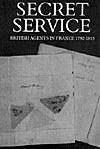
Author: Elizabeth Sparrow
Pages: 473
Illustrations: 19 black & white reproductions of period engravings of personalities, places and building plans.
Maps: Endpaper map of Europe in 1806.
Footnotes: 1092, nearly all to archival material.
Appendices: None
Bibliography: 152 books, mostly memoirs, well-regarded secondary sources and academic magazine
articles, plus 23 archives, including the British Library, Public Records Office and other government records, French archives, including Vincennes, and Swiss Archives from Neufchatel.
Index: More than 3,000 entries including cross-references to the relationships between the major personalities.
Publisher: The Boydell Press, Woodbridge, England.
Publication Date: 1999
Binding: Cloth (hardbound)
ISBN: 0-85115-764-5
Price: $45.00
Summary: Secret Service is an excellent examination of one of the murkier areas of the Napoleonic period. Sparrow tells the story of espionage operations run by Great Britain in France, the people involved, including many French figures and other Europeans, and their methods. The triumphs and failures incorporate all the elements of a good spy story -- except that this actually happened.
When asked in a recent interview in this magazine which areas he felt warranted further investigation, Colonel Elting did not hesitate to include espionage and intelligence gathering. Napoleon himself is reputed to have said that a spy in the right place was worth 40,000 men.
Using a wide range of British archives and France's Bibliotheque Nationale, together with valuable secondary works, Elizabeth Sparrow tells the story of the establishment of the British espionage service as the French Revolutionary Wars began, taking it through to the second Bourbon restoration in 1815. The initial networks were largely the work of William Wickham, developed out of the Aliens Office, itself looking for French agitators amongst the emigres fleeing the Revolution by crossing the Channel. It eventually grew into a full-fledged network to handle both information gathering and the flow of English gold.
That is only part of the story. There are many French characters, the more unfamiliar being the men involved in the espionage and message-carrying. Throughout there are many famous names involved in this clandestine business to see what they could gain for themselves.
The first part of the book covers the British involvement with the various French factions, especially those moderate monarchists who favored any strongman who could get rid of the hated Jacobins. The Bourbons had done little to help themselves and, contrary to popular belief, Britain was not necessarily seeking their restoration initially. Thus British efforts turned towards any successful French general -- Dumouriez, Pichegru, Moreau and finally Bonaparte. Ever wonder how the future First Consul got through the British blockade of Egypt? These allegations by Sparrow are sure to cause consternation and controversy.
The second part of the book covers the new strategy against France when it came under Napoleon's rule. This is rather more straightforward both in terms of the text and British operations, now primarily aimed at helping their allies by channeling money and operations in France to divert Napoleon's attention. As the Peace of Amiens broke down barely a year after it was signed in March of 1802, what remained of the espionage networks were reactivated in a bid to utilize internal dissent to ultimately bring about Napoleon's fall.
Again, many famous personalities appear, and brooding over it all is the cunning and shadowy French Minister of Police Joseph Fouche, living an apparently charmed life, somehow preventing Napoleon from acting decisively against him.
According to Sparrow, the success of the British spy network is stunning -- it is often in control of the Paris police, enabling key operatives to be spirited out of danger or even jail. Vital information, both military and political, made its way into allied hands as English gold did its work. Surprisingly, even the famous General Savary, Napoleon's second Minister of Police from 1810 to 1814, was often a few steps behind. There were disasters too, especially in 1804, when a plot to assassinate Napoleon was foiled and many agents caught. In fact all the elements of a good spy story are here, including double-crosses, invisible ink, assassination conspiracies, false identities, plus the unfortunate souls who found themselves sacrificed to save operations or senior individuals.
Few books in the last twenty years have added greatly to our knowledge of the period, but this is certainly one of them. This book may change some of your views -- it is essential reading.
Napoleonic Library: Reviews of selected books
-
Book Review: Secret Service: British Agents in France 1792-1815
Book Review: 1815: The Waterloo Campaign
Book Review: In the Service of the Tsar Against Napoleon
Book Review: In the Legions of Napoleon
Book Review: Followup: Greenhill Napoleonic Wars Data Book
Book News: Various Publishing Efforts
Back to Table of Contents -- Napoleon #16
Back to Napoleon List of Issues
Back to MagWeb Master Magazine List
© Copyright 2001 by Napoleon LLC.
This article appears in MagWeb (Magazine Web) on the Internet World Wide Web.
The full text and graphics from other military history magazines and gaming magazines are available at http://www.magweb.com
Order Napoleon magazine direct